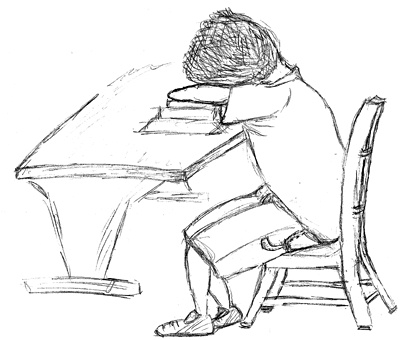All Nonfiction
- Bullying
- Books
- Academic
- Author Interviews
- Celebrity interviews
- College Articles
- College Essays
- Educator of the Year
- Heroes
- Interviews
- Memoir
- Personal Experience
- Sports
- Travel & Culture
All Opinions
- Bullying
- Current Events / Politics
- Discrimination
- Drugs / Alcohol / Smoking
- Entertainment / Celebrities
- Environment
- Love / Relationships
- Movies / Music / TV
- Pop Culture / Trends
- School / College
- Social Issues / Civics
- Spirituality / Religion
- Sports / Hobbies
All Hot Topics
- Bullying
- Community Service
- Environment
- Health
- Letters to the Editor
- Pride & Prejudice
- What Matters
- Back
Summer Guide
- Program Links
- Program Reviews
- Back
College Guide
- College Links
- College Reviews
- College Essays
- College Articles
- Back
Blame Biology
Every day alarm clocks are ringing, parents are banging on the door, turning the lights on, and pulling the covers off their groggy teenagers only to get them to school on time. Then once in school the teens lay their heads down on the desk for a snooze. Do you or your children feel like this? Well, you aren't the only ones.
Don’t blame the teachers; don’t blame the students. Blame biology. As teenagers start puberty, their internal clocks change, and it can be harder for them to get to bed early and wake up early. It’s not teens’ fault when they can’t fall asleep until 11:00 p.m. The body’s circadian rhythm change causes teens to naturally feel more awake at night. At the time of the internal change, school is also changing and becoming more intense.
Teachers are assigning more homework, adding up the hours at night of doing homework. Busyness is one reason high school students don’t get enough sleep. But it’s not the only reason. For example, because of the internal change the ten year-old who went to bed at 9:00 p.m. becomes the thirteen year-old who can’t get to sleep until 11:00 p.m. The average senior is only getting seven hours of sleep when they need about nine. This causes some students in morning classes to have the same attentiveness as a person with narcolepsy, a disease that causes a person to fall asleep uncontrollably. Putting students in school this tired only hurts their grades and health.
There are also major health concerns that go along with not sleeping enough. Lack of sleep causes the risk of obesity, heart disease, diabetes, headaches, depression, and death. Although these problems strike years after the lack of sleep, it is still nothing to be taken lightly. Car accidents are also more prone to happen when teens are tired. Falling asleep at the wheel is clearly dangerous, but the lack of sleep affects the teenager’s ability to drive safely even if they don't fall asleep. Drowsiness makes drivers less attentive, slows reaction time, and affects a driver's ability to make decisions. According to the National Highway Traffic Safety Administration, every one in six crashes with a fatality was caused by a drowsy driver. If we can change the number of crashes and deaths every year by doing something simple, why aren’t we trying?
How do we change it?
Doctors and professionals are trying to get schools to push the first period bell forward a half hour to an hour. The schools that have already done this say students look more alert for school and actually want to be there. The number of dropouts will decline tremendously and parents will see an incline in their students’ grades. I realize schedules would have to change but if change is for the physical and mental health, why protest it? Parents and administration—start making an effort at securing a healthy life for the future generation.

Similar Articles
JOIN THE DISCUSSION
This article has 0 comments.
